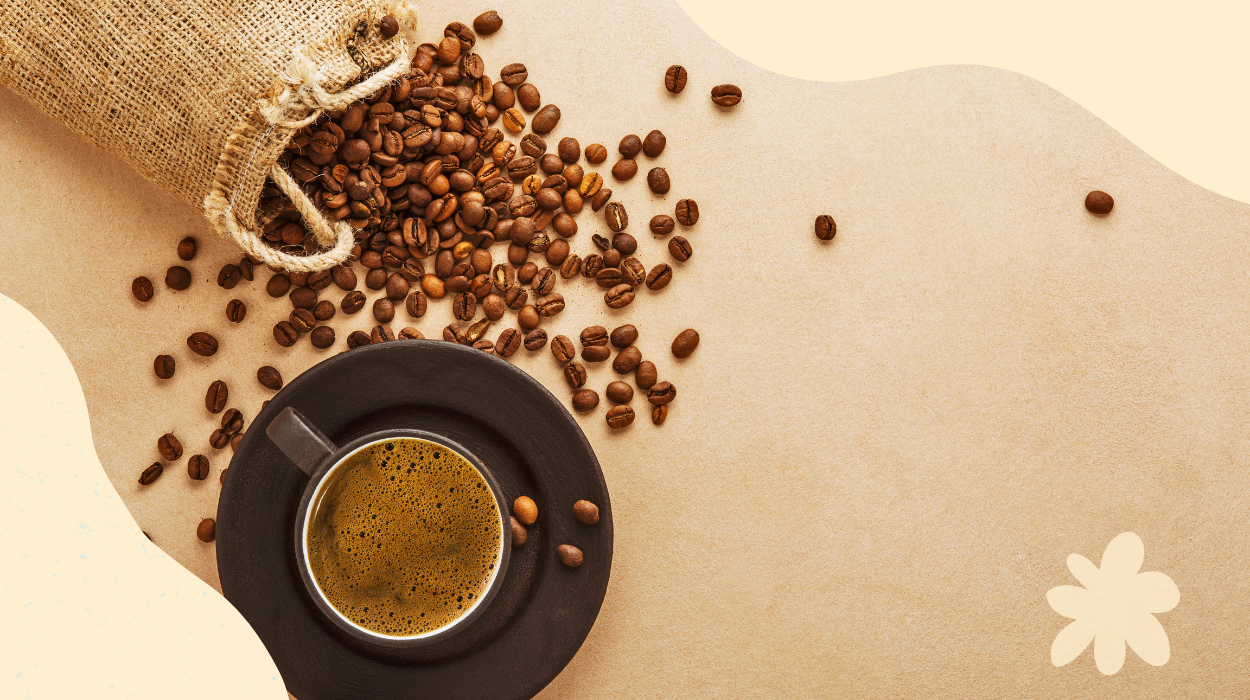 Expert's opinion
Expert's opinion
Expert's opinion
The article is a subjective view on this topic written by writers specializing in medical writing.
It may reflect on a personal journey surrounding struggles with an illness or medical condition, involve product comparisons, diet considerations, or other health-related opinions.
Although the view is entirely that of the writer, it is based on academic experiences and scientific research they have conducted; it is fact-checked by a team of degreed medical experts, and validated by sources attached to the article.
The numbers in parenthesis (1,2,3) will take you to clickable links to related scientific papers.
Does Coffee Cause Inflammation? Here’s What To Know In 2024

Coffee is one of the most popular drinks in the world. People drink it because of its stimulating effects, especially in the morning. This natural buzz is all thanks to caffeine. This chemical provides a stimulating effect. However, as a psychoactive drug, it also poses a risk of addiction.[1] But coffee contains more than just caffeine.
The drink also offers several anti-inflammatory compounds[2] that make it a good addition to an anti-inflammatory diet. But research shows that coffee has inflammatory effects[3] on some people.
So, does coffee cause inflammation? Or does it help to fight against it? Find out everything you need to know about coffee and inflammation below.
Is Coffee Inflammatory?
Research shows that coffee decreases inflammation in some people, but raises it in others.
Many people drink coffee every day for its stimulating effects. But does coffee cause inflammation?
Coffee contains chemicals that have a beneficial effect on inflammation. There are several ways to improve the anti-inflammatory properties of coffee. These include skipping the sugar and adding milk.
There are many other ways to combat inflammation, like exercise, anti-inflammatory foods, and probiotics.
How Do Foods And Drinks Affect Inflammation?
Inflammation gets a bad rap, but this process plays an important role in the body. Short term, it helps to fight off infections[4] and heal wounds.
However, long-term chronic inflammation can cause problems. Poor diet and lifestyle choices cause body-wide inflammation linked to chronic diseases such as cancer,[5] diabetes, cardiovascular disease, and depression.
People seek anti-inflammatory food options and products for inflammation as part of a healthy lifestyle. They also try to avoid foods that cause it.
But is coffee inflammatory?
Before we answer this, let’s look at how some food and drinks impact anti-inflammatory benefits.
Processed Foods Alter Gut Bacteria
Americans continue to eat more processed foods[6] than ever before. Research links these food items, such as cereals, bread, cakes, and ready meals, to a heightened risk of irritable bowel disease[7] and heart disease.[8]
Processed foods can cause an inflammatory response by altering gut bacteria. In doing so, these products change how these microbes interact with the immune system. This can give rise to chronic inflammation.[9]
Excess Sugar Drives Inflammation
Adults in America consume around 17 teaspoons of added sugar[10] each day — that’s two to three times more than recommended. Sugar appeals to the taste buds but can have a negative effect elsewhere in the body.
High amounts of sugar contribute to low-grade chronic inflammation,[11] further exacerbating symptoms and other health conditions. This includes type 2 diabetes, metabolic syndrome, obesity, and heart disease.
It’s also linked to mental health conditions like depression[12] and anxiety.[13]
Artificial Sweeteners Can Trigger The Body’s Inflammatory Response
People choose artificially sweetened foods to avoid sugar and lose weight.[14] However, some sweeteners can contribute to chronic inflammation.
Aspartame, a product 200 times sweeter[15] than table sugar, can cause inflammation in some people. Research shows the chemical can aggravate gut inflammation[16] in those susceptible.
An Imbalance Of Fatty Acids Can Cause Inflammation
Omega fatty acids play a key role in human health. However, we need to consume them in the correct amounts.
The standard American diet contains up to 25 times the amount of omega-6 fatty acids compared to omega-3. Consuming too many omega-6 fatty acids can increase inflammation in the body.[17]
The Link Between Coffee And Inflammation
Food and drinks can influence chronic inflammation in the body. But does coffee consumption increase low-grade inflammation? And is too much caffeine inflammatory? The findings on this topic remain mixed.
Some research suggests coffee consumption lowers inflammation, while other evidence suggests it can have the opposite effect. The amount of coffee you drink every day is also important, especially when it comes to avoiding anxiety and jitters; don’t forget there is a decaf coffee option. Continue reading to find out more.
Studies Show Mixed Results
People use coffee for weight loss since it might boost their metabolism and suppress their appetite. It’s generally seen as a drink beneficial to your overall health.
But does caffeine cause inflammation and do more harm than good?
It turns out that caffeine can both increase and decrease inflammation.[3] However, the anti-inflammatory effects of coffee are tied to coffee[18] itself and not caffeine.
Coffee Contains Anti-Inflammatory Chemicals
Coffee contains many different chemicals besides caffeine, including polyphenols. These natural compounds, found in many plants, have been found to have anti-inflammatory effects.[19]
Research has found that one particular polyphenol in coffee can quench intestinal inflammation.[20] The chemical could also play a future role in treating chronic diseases such as arthritis[21] and joint pain. This is an exciting finding for those wondering, “Does coffee cause joint inflammation?”
How To Drink Coffee To Fight Inflammation?
Drinking caffeinated coffee can elevate inflammation in some people while lowering it in others. So, is there a way to boost your chances of reaping the health benefits of coffee consumption?
There are several ways to optimize the anti-inflammatory properties of this stimulating drink, such as:
Skip The Sugar
Coffee drinkers often add a teaspoon or two of sugar to their coffee to sweeten it. Modern diets are already extremely high in sugar, which contributes to inflammation.[11] Adding it to coffee only increases the amount of sugar you’ll consume in a day.
Avoid Artificial Sweeteners
As you learned above, some artificial sweeteners also cause inflammation. Without sugar and sweeteners, coffee can taste bitter and unpleasant.
Why not add some honey instead? Although high in sugar, honey has proven anti-inflammatory effects.[22]
Add Milk
Milk usually accompanies sugar as a coffee additive. Unlike sugar, milk can enhance the anti-inflammatory effects of regular coffee consumption.
Research shows that adding milk to coffee creates a mixture of proteins and antioxidants. This chemical cocktail decreases inflammation in immune cells.[23]
Plant-based milk, such as coconut milk, are a tasty alternative for people that don’t drink dairy. However, we need to wait for future studies to see if they create a similar effect when mixed with coffee.
Limit Coffee Intake Later In The Day
Regular coffee drinkers should avoid drinking coffee later in the day since caffeine affects sleep quality.[24] Over time, lack of sleep can increase the risk[25] of developing several diseases and cause inflammation.[26] So prioritize quality sleep!
Other Natural Ways To Reduce Inflammation
Besides drinking coffee, other lifestyle changes help to combat inflammation, such as:
Eating Anti-Inflammatory Foods
Anti-inflammatory foods[27] contain antioxidants and other compounds that help to counter inflammation. These foods include:
- Tomatoes.
- Olive oil.
- Walnuts.
- Fatty fish.
- Fruit.
- Green leafy vegetables.
Eliminating Inflammatory Foods
As well as increasing the number of anti-inflammatory foods in your diet, eliminate some of the culprits. Foods that increase inflammation[27] in the body include processed foods and red meat, such as:
- French fries.
- White bread.
- Hamburgers.
- Margarine.
- Soda.
Exercising Regularly
Exercising regularly comes with many health benefits, including weight management[28] and better mental health.[29] Exercise also produces an anti-inflammatory effect[30] on the body. Keep this in mind every time you don’t feel like going for a run or hitting the gym!
Taking Probiotics
Probiotic foods contain beneficial bacteria. They work hand-in-hand with supplements for leaky gut to boost intestinal health.[31] Probiotic foods also help to lower the inflammatory response.[32] Common probiotic foods[33] include:
- Yogurt — including plant-based ones.
- Raw sauerkraut.
- Kombucha.
- Pickles — only ones made without vinegar.
- Kimchi.
- Kefir.
The Bottom Line
Research shows that coffee can both raise and lower inflammation.
Coffee contains anti-inflammatory chemicals, including polyphenols, that help boost overall health. Yet the drink can still cause inflammation in some people. You can optimize the anti-inflammatory effects of coffee by adding milk and skipping sugar and sweeteners.
Also, try to avoid coffee later in the day since it can impact your quality of sleep. Other natural ways to reduce inflammation include exercise, probiotic foods, and anti-inflammatory foods.
In the end, everyone’s reaction to coffee can be different. Just watch for any symptoms that it might be doing more harm than good — and stick to an amount that doesn’t leave you with negative side effects.
+ 33 sources
Health Canal avoids using tertiary references. We have strict sourcing guidelines and rely on peer-reviewed studies, academic researches from medical associations and institutions. To ensure the accuracy of articles in Health Canal, you can read more about the editorial process here
- Jain, S., Adya Shanker Srivastava, Raghunath Prasad Verma and Gaurav Maggu (2017). Caffeine addiction: Need for awareness and research and regulatory measures. [online] 41, pp.73–75. doi:https://doi.org/10.1016/j.ajp.2017.01.008.
- Bułdak, R.J., Tomasz Hejmo, Osowski, M., Łukasz Bułdak, Kukla, M., Polaniak, R. and Birkner, E. (2018). The Impact of Coffee and Its Selected Bioactive Compounds on the Development and Progression of Colorectal Cancer In Vivo and In Vitro. [online] 23(12), pp.3309–3309. doi:https://doi.org/10.3390/molecules23123309.
- Besnik Muqaku, Tahir, A., Klepeisz, P., Bileck, A., Kreutz, D., Mayer, R.L., Meier, S.M., Gerner, M.C., Schmetterer, K.G. and Gerner, C. (2016). Coffee consumption modulates inflammatory processes in an individual fashion. [online] 60(12), pp.2529–2541. doi:https://doi.org/10.1002/mnfr.201600328.
- Chen, L.-J., Deng, H., Cui, H., Fang, J., Zuo, Z., Deng, J., Li, Y., Wang, X. and Zhao, L. (2015). Inflammatory responses and inflammation-associated diseases in organs. [online] 9(6), pp.7204–7218. doi:https://doi.org/10.18632/oncotarget.23208.
- Furman, D., Campisi, J., Verdin, E., Carrera-Bastos, P., Targ, S., Franceschi, C., Ferrucci, L., Gilroy, D.W., Fasano, A., Miller, G.W., Miller, A.H., Mantovani, A., Weyand, C.M., Nir Barzilai, Goronzy, J.J., Rando, T.A., Effros, R.B., Lucia, A., Kleinstreuer, N. and Slavich, G.M. (2019). Chronic inflammation in the etiology of disease across the life span. [online] 25(12), pp.1822–1832. doi:https://doi.org/10.1038/s41591-019-0675-0.
- Juul, F., Parekh, N., Carlos Augusto Monteiro and Chang, V.W. (2021). Ultra-processed food consumption among US adults from 2001 to 2018. [online] 115(1), pp.211–221. doi:https://doi.org/10.1093/ajcn/nqab305.
- Narula, N., Wong, E.B., Dehghan, M., Mente, A., Rangarajan, S., Lanas, F., Patricio Lopez-Jaramillo, Rohatgi, P., P V M Lakshmi, Varma, R., Orlandini, A., Avezum, A., Wielgosz, A., Poirier, P., Almadi, M.A., Yuksel Altuntas, Kien Ming Ng, Jephat Chifamba, Yeates, K. and Thandi Puoane (2021). Association of ultra-processed food intake with risk of inflammatory bowel disease: prospective cohort study. [online] pp.n1554–n1554. doi:https://doi.org/10.1136/bmj.n1554.
- Srour, B., Léopold Fezeu, Emmanuelle Kesse-Guyot, Allès, B., Méjean, C., Andrianasolo, R.M., Eloi Chazelas, Mélanie Deschasaux, Serge Hercberg, Galan, P., Carlos Augusto Monteiro, Julia, C. and Touvier, M. (2019). Ultra-processed food intake and risk of cardiovascular disease: prospective cohort study (NutriNet-Santé). [online] pp.l1451–l1451. doi:https://doi.org/10.1136/bmj.l1451.
- Shi, Z. (2019). Gut Microbiota: An Important Link between Western Diet and Chronic Diseases. [online] 11(10), pp.2287–2287. doi:https://doi.org/10.3390/nu11102287.
- www.heart.org. (2019). How much sugar is too much? [online] Available at: https://www.heart.org/en/healthy-living/healthy-eating/eat-smart/sugar/how-much-sugar-is-too-much
- Ma, X., Nan, F., Liang, H., Shu, P., Fan, X., Song, X., Hou, Y. and Zhang, D. (2022). Excessive intake of sugar: An accomplice of inflammation. [online] 13, pp.988481–988481. doi:https://doi.org/10.3389/fimmu.2022.988481.
- Perez-Cornago, A., Shipley, M.J., Llewellyn, C.H. and Brunner, E.J. (2017). Sugar intake from sweet food and beverages, common mental disorder and depression: prospective findings from the Whitehall II study. [online] 7(1). doi:https://doi.org/10.1038/s41598-017-05649-7.
- Kose, J., Cheung, A., Léopold Fezeu, Sandrine Péneau, Debras, C., Touvier, M., Serge Hercberg, Galan, P. and Andreeva, V.A. (2021). A Comparison of Sugar Intake between Individuals with High and Low Trait Anxiety: Results from the NutriNet-Santé Study. [online] 13(5), pp.1526–1526. doi:https://doi.org/10.3390/nu13051526.
- Daher, M.I., Fahd, C., Afif and Sacre, Y. (2022). Trends and amounts of consumption of low-calorie sweeteners: A cross-sectional study. [online] 48, pp.427–433. doi:https://doi.org/10.1016/j.clnesp.2022.01.006.
- Kamila Czarnecka, Pilarz, A., Aleksandra Rogut, Maj, P., Jolanta Szymańska, Łukasz Wiktor Olejnik and Piotr Szymański (2021). Aspartame—True or False? Narrative Review of Safety Analysis of General Use in Products. [online] 13(6), pp.1957–1957. doi:https://doi.org/10.3390/nu13061957.
- Basson, A.R., Rodriguez-Palacios, A. and Fabio Cominelli (2021). Artificial Sweeteners: History and New Concepts on Inflammation. [online] 8. doi:https://doi.org/10.3389/fnut.2021.746247.
- Mount Sinai Health System. (2013). Omega-6 fatty acids Information | Mount Sinai – New York. [online] Available at: https://www.mountsinai.org/health-library/supplement/omega-6-fatty-acids
- Paiva, C., Beserra, B., Reis, C., Dórea, J.G., Thm Da Costa and Amato, A.A. (2017). Consumption of coffee or caffeine and serum concentration of inflammatory markers: A systematic review. [online] 59(4), pp.652–663. doi:https://doi.org/10.1080/10408398.2017.1386159.
- Hussain, T., Tan, B., Yin, Y., François Blachier, Carine, M. and Najma Rahu (2016). Oxidative Stress and Inflammation: What Polyphenols Can Do for Us? [online] 2016, pp.1–9. doi:https://doi.org/10.1155/2016/7432797.
- Dorota Zielińska, Henryk Zieliński, José Moisés Laparra, Dorota Szawara-Nowak, Honke, J. and Juan Antonio Giménez-Bastida (2021). Caffeic Acid Modulates Processes Associated with Intestinal Inflammation. [online] 13(2), pp.554–554. doi:https://doi.org/10.3390/nu13020554.
- Wang, W., Sun, W. and Jin, L. (2017). Caffeic acid alleviates inflammatory response in rheumatoid arthritis fibroblast-like synoviocytes by inhibiting phosphorylation of IκB kinase α/β and IκBα. [online] 48, pp.61–66. doi:https://doi.org/10.1016/j.intimp.2017.04.025.
- Yazan Ranneh, Abdah Md Akim, Hasiah Ab Hamid, Huzwah Khaza’ai, Fadel, A., Zainul Amiruddin Zakaria, Albujja, M.H. and Mohd (2021). Honey and its nutritional and anti-inflammatory value. [online] 21(1). doi:https://doi.org/10.1186/s12906-020-03170-5.
- Journal of Agricultural and Food Chemistry. (2023). Phenolic Acid–Amino Acid Adducts Exert Distinct Immunomodulatory Effects in Macrophages Compared to Parent Phenolic Acids. [online] Available at: https://pubs.acs.org/doi/abs/10.1021/acs.jafc.2c06658
- Clark, I. and Landolt, H.-P. (2017). Coffee, caffeine, and sleep: A systematic review of epidemiological studies and randomized controlled trials. [online] 31, pp.70–78. doi:https://doi.org/10.1016/j.smrv.2016.01.006.
- NHLBI, NIH. (2022). What Are Sleep Deprivation and Deficiency? [online] Available at: https://www.nhlbi.nih.gov/health/sleep-deprivation
- Harvard Health. (2022). How sleep deprivation can cause inflammation – Harvard Health. [online] Available at: https://www.health.harvard.edu/sleep/how-sleep-deprivation-can-cause-inflammation
- Harvard Health. (2014). Foods that fight inflammation – Harvard Health. [online] Available at: https://www.health.harvard.edu/staying-healthy/foods-that-fight-inflammation
- CDC (2022). Benefits of Physical Activity . [online] Centers for Disease Control and Prevention. Available at: https://www.cdc.gov/physicalactivity/basics/pa-health/index.htm
- Prakash, M.D., Stojanovska, L., Momir Polenakovic, Marijan Bosevski and Apostolopoulos, V. (2017). Exercise and mental health. [online] 106, pp.48–56. doi:https://doi.org/10.1016/j.maturitas.2017.09.003.
- Scheffer, L. and Latini, A. (2020). Exercise-induced immune system response: Anti-inflammatory status on peripheral and central organs. [online] 1866(10), pp.165823–165823. doi:https://doi.org/10.1016/j.bbadis.2020.165823.
- Chaiyavat Chaiyasut, Nevin Sanlier, Narissara Lailerd, Sasithorn Sirilun, Suchanat Khongtan, Pranom Fukngoen, Sartjin Peerajan, Saelee, M., Khontaros Chaiyasut, Periyanaina Kesika and Phakkharawat Sittiprapaporn (2022). Probiotics Supplementation Improves Intestinal Permeability, Obesity Index and Metabolic Biomarkers in Elderly Thai Subjects: A Randomized Controlled Trial. [online] 11(3), pp.268–268. doi:https://doi.org/10.3390/foods11030268.
- Shahbazi, R., Farzaneh Sharifzad, Bagheri, R., Alsadi, N., Hamed Yasavoli-Sharahi and Matar, C. (2021). Anti-Inflammatory and Immunomodulatory Properties of Fermented Plant Foods. [online] 13(5), pp.1516–1516. doi:https://doi.org/10.3390/nu13051516.
- Harvard Health. (2018). How to get more probiotics – Harvard Health. [online] Available at: https://www.health.harvard.edu/staying-healthy/how-to-get-more-probiotic



